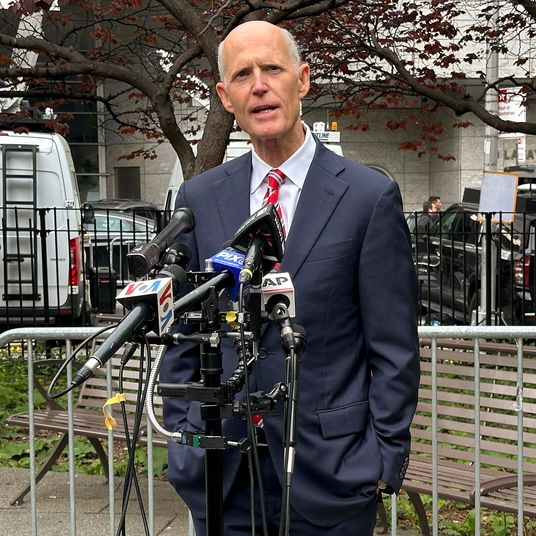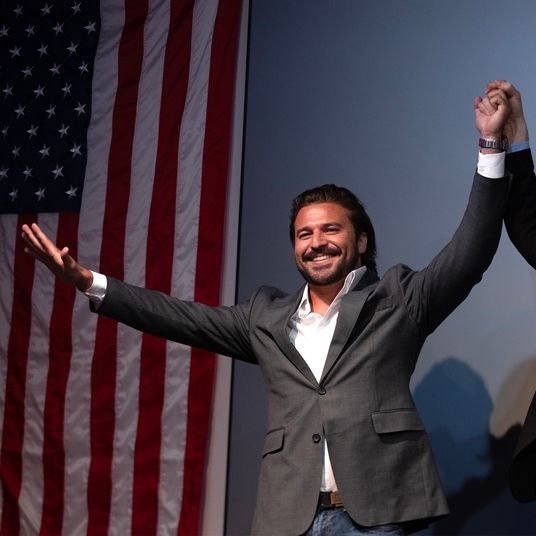
Wednesday’s Senate hearing with social-media CEOs was theoretically about whether their companies’ legal liability protections under Section 230 of the Communications Decency Act of 1996 should be revisited, but senators at the hearing unsurprisingly spent little time on the topic of Section 230. Rather than focusing on federal law, Republican senators at the hearing focused on policies and practices at the companies testifying, especially Twitter. It was an opportunity for them to be mad online — specifically, to be mad on a videoconference.
Texas senator Ted Cruz wanted to know why Twitter thought it was appropriate to prevent users from sharing a link to a New York Post story about Hunter Biden’s purported emails. Wisconsin senator Ron Johnson wanted to know why Twitter didn’t take down a post accusing him (in jest, I think) of strangling a dog. Tennessee senator Marsha Blackburn asked whether Google still employed an engineer who “has had very unkind things to say about me.” (In 2018, Breitbart News reported on leaked emails in which engineer Blake Lemoine called Blackburn a “thug” and a “terrorist” for backing internet-related legislation he opposed.)
Nowhere have Republicans proposed a policy that would do anything about the problems they have complained about at the hearing. In theory, they want to revise Section 230 in a way that would stop companies from making moderating decisions they view as unfavorable to conservatives. But Section 230, which broadly says internet sites aren’t liable for user-generated content, is a law that makes it easier for sites to allow users to run their mouths. Weakening its protections would tend to lead to more moderation and more restriction, as sites seek to restrict user content that could create legal liability. Tech companies are responsive to negative attention from legislators, but for this reason, the odds of that negative attention leading to legislation that materially affects their business models are low.
Furthermore, as both lawmakers and the tech giants themselves sometimes have trouble admitting, decisions about moderation are complex judgment calls. You can’t write a law that makes platforms politically “neutral” by any standard, and the platforms themselves have a lot of trouble writing policies that can be consistently applied. It’s inherently messy to develop and apply the rules, and — as Colorado senator Cory Gardner acknowledged at the hearing — it’s not an area where conservatives can get what they want by having the government be more involved.
That’s why it’s for the best that the hearing was so light on public-policy content. This hearing was really about private policy: conservatives trying to get private institutions (in this case, tech companies) to make choices they like, and relying on lawmakers to do so in part because more standard channels of influence — such as pressure from consumers, workers, and stockholders — don’t seem to be working for them in this area.
There’s nothing inherently wrong with public officials lobbying over private policy. Private policies matter, and while content moderation probably doesn’t matter as much as politicians and the Extremely Online think it does, it does matter to an extent. So members of Congress can play an appropriate role by voicing concerns about private policies and influencing what firms do, even if there isn’t a useful legislative solution available.
Of course, it helps if the concerns aren’t stupid.
When members ascribe the failure of specific tweets to go viral to some nefarious corporate conspiracy, that’s unfounded conspiracy thinking. And for Blackburn to seek the firing of a specific employee for expressing a policy opinion is egregious. But Twitter’s handling of the New York Post — the platform blocked posts that linked to a story in a major newspaper, not on the grounds that it was necessarily false, but because it appeared to be based on hacked documents — ran against American norms of press freedom. Twitter’s policy, if applied consistently, would have chilled coverage of important news matters, including the president’s tax returns, which are highly unlikely to have gotten to the New York Times in an authorized manner. I don’t think Congress ought to legislate what content private companies allow users to share, but it’s fine for members of Congress to complain publicly when those companies make bad choices, and Twitter rescinding this policy after public outcry is an example of private policy-making working like it should.
Using hearings as a platform to lobby on private policy is a long-standing tradition for both parties — see the bipartisan 1980s hearings about violent lyrics in rock music, for example — but conservatives have a particular zeal for it with regard to tech companies, and it’s not because they’re the only ones with concerns about the private policies these companies make. It’s that liberals have other, better strategies available to lobby these companies.
The liberal lean of the Silicon Valley worker base creates a natural stakeholder that is inclined, for example, to push Facebook to rein in the president’s inflammatory posting or to push Google not to do work with the Department of Defense that could support drone warfare. And because a company’s target consumer is typically younger, more educated, and more urban than the median voter, most companies are aiming at a more liberal demographic than most politicians. This is a reason that consumer-product companies like Nike have become more inclined in recent years to align themselves with the values of liberal customers. The social-media giants, being accountable both to these consumer-product firms and to consumers directly, are also influenced by this pressure.
Tech companies have conservative-leaning employees with interests, too (that’s how the James Damore fiasco happened and part of why Google has sought to de-emphasize distracting political discussions at work), and they have conservative customers. But conservatives have, for whatever reason, shown themselves to be much less effective than liberals at using consumer power or labor power to bring private-policy pressure on firms.
This impotence is a reason conservative political messaging and conservative voter behavior have recently become so divorced from public policy-making. Rich Lowry writes for National Review that if Trump wins (which he thinks he probably won’t), it will be because “he’s the vessel for registering opposition to everything from the 1619 Project to social media’s attempted suppression of the Hunter Biden story.” On its face, this makes very little sense — the New York Times isn’t on the ballot, and neither is Twitter nor Colin Kaepernick nor any other person or institution that is a cultural flash point except the president himself. But with conservatives having such difficulty making people inside key private institutions care about their grievances, the government is pretty much the last place they can act out and make liberals listen.
Of course, they may be about to lose that avenue of influence, too. It does not appear that enough voters are inclined to make private cultural grievances the key factor behind their vote for Republicans to win this election. If they lose control of the Senate next week, they won’t be able to unilaterally summon tech CEOs to any more hearings. Without the presidency, they won’t be able to threaten unfavorable regulatory actions. It might be a good time for conservatives to ask themselves what happened to their ability to apply private-policy pressure through private channels — it’s not as though conservatives are not stakeholders in private institutions — and if they find an answer, we might even be able to shift the content of political debates more firmly toward public policy.





























